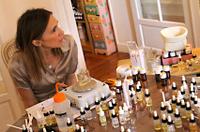Perfume Workshop in Paris
Paris, France
Rating: 









Trip Type: Shopping Tours
Duration: 2 hours
Learn about perfume, its history and current trends, then create several perfumes of your own guided by a top Paris "nose" and perfume expert.
More About This Activity All Shopping Tours →
Learn about perfume, its history and current trends, then create several perfumes of your own guided by a top Paris "nose" and perfume expert.
The workshop is led by an expert in the perfume field who teaches professionals at the well know school of Perfumery in Versailles and is also a consultant to firms like L'Oreal. The first part of the workshop will be a discussion on the origin of The Eau de Cologne in Florence in 1221 at the convent of Santa Maria Novella, and the key ingredients and evolution around 1725 of the production of perfume in the city of Cologne. In the first half you will learn how to smell and describe the ingredients of an eau de cologne and to learn about the characteristics belonging to different families of odors. This is then followed by a discussion of the development of different kinds of Cologne and Eaux Fraiches on the market.
The second half of the workshop is the practical part. After having smelled the different types of Eau de Cologne and Eaux Fraiches, your teacher will show you a very simple method to create the perfumes you like which you can take home with you. Six different perfumes are used (classic cologne, green tea, spicy, fruity, floral ozonic and chypre in atomizers). All the raw materials are guaranteed to correspond to the European legislation and to the IFRA recommendations.
The second half of the workshop is the practical part. After having smelled the different types of Eau de Cologne and Eaux Fraiches, your teacher will show you a very simple method to create the perfumes you like which you can take home with you. Six different perfumes are used (classic cologne, green tea, spicy, fruity, floral ozonic and chypre in atomizers). All the raw materials are guaranteed to correspond to the European legislation and to the IFRA recommendations.
« Go Back

